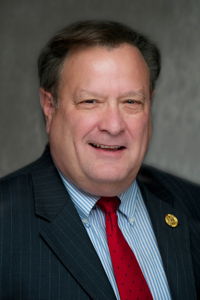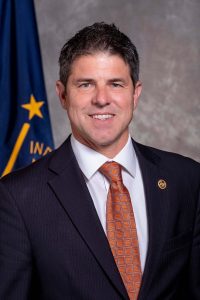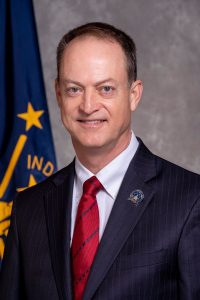Subscriber Benefit
As a subscriber you can listen to articles at work, in the car, or while you work out. Subscribe NowIndiana State Sen. Aaron Freeman has been appointed the new chair of the Senate Corrections and Criminal Law Committee, taking over from a fellow Republican senator who left the GOP caucus earlier this year due to disagreements about the state’s new abortion legislation.

Indiana Senate President Pro Tem Rodric Bray, R-Martinsville, announced his appointment of Freeman, of Indianapolis, as chair of the corrections committee on Thursday. The committee “deals primarily with issues pertaining to the criminal justice system, criminal penalties and rehabilitation of criminal offenders,” according to a statement from Bray’s office.
The new chair has been a member of the committee since he was elected to the Indiana Senate in 2016, and has been an attorney since 2004.
Since 2009, Freeman has been a solo practitioner at The Freeman Law Office. According to his firm website, he practices in the areas of criminal defense, civil litigation, family law and estate planning.
“Issues that come before the corrections committee can be complex and wide-reaching, so it’s important our committee has robust discussions as we sift through issues pertaining to criminal behaviors, deterrence and rehabilitation,” Freeman said in a statement released by Bray’s office. “I am grateful for the opportunity to chair this committee and pledge that we will always endeavor to put Hoosiers first as we continue to improve our justice system so it works well for all those affected by it.”
Freeman has assumed the duties of committee chair immediately. He replaces Sen. Mike Young, an Indianapolis Republican who has clashed with the majority party.

In a July letter, Young resigned from the Republican caucus due to disagreements over the party’s handling of abortion legislation during this summer’s special session.
The final bill banned abortions except in certain cases of rape or incest, to protect the physical health of the mother, or if a fetus is diagnosed with a fatal anomaly. That law has since been enjoined.
In his letter, Young said his disagreement was centered on the exceptions to the abortion ban. He wrote that he “(doesn’t) want to be part of a decision that chooses which babies die and which babies live.”
Additionally, Young cited other alleged incidents of disrespect by GOP leaders in his letter, according to the Indiana Capital Chronicle. That included frequently canceled meetings with Bray.

Bray said he “completely disagree(d)” with Young’s allegations of disrespect.
Neither Bray nor Freeman referenced Young in their statements about Freeman’s appointment as committee chair.
Regarding Freeman, Bray said, “Aaron is passionate about making sure our laws are fair for both victims of crimes and those accused, and I’m confident he will serve Hoosiers well as he takes on this important role.”
In the final vote on the abortion bill, Senate Enrolled Act 1, Freeman voted “yea” while Young voted “nay.”
Freeman’s appointment marks the second notable leadership change in the Indiana Senate GOP this year.

In August, Sen. Chris Garten, R-Charlestown, replaced Sen. Mark Messmer, R-Jasper, as majority floor leader, the second-highest leadership position in the caucus.
It wasn’t clear why Messmer — who had been majority floor leader since 2018 — was replaced, according to the Indiana Capital Chronicle. However, Messmer was not present at the final vote on SEA 1, and he voted down an earlier version of the bill, saying lawmakers’ discourse showed the impossibility of “threading the needle” on abortion-related matters.
Messmer remains chair of the Senate Committee on Environmental Affairs.
Please enable JavaScript to view this content.

